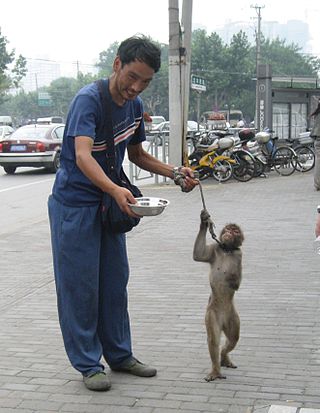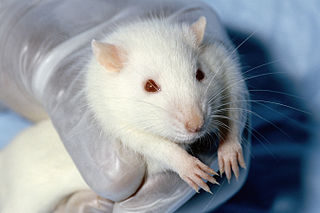
Animal welfare is the well-being of non-human animals. Formal standards of animal welfare vary between contexts, but are debated mostly by animal welfare groups, legislators, and academics. Animal welfare science uses measures such as longevity, disease, immunosuppression, behavior, physiology, and reproduction, although there is debate about which of these best indicate animal welfare.
First National Bank of Boston v. Bellotti, 435 U.S. 765 (1978), is a U.S. constitutional law case which defined the free speech right of corporations for the first time. The United States Supreme Court held that corporations have a First Amendment right to make contributions to ballot initiative campaigns. The ruling came in response to a Massachusetts law that prohibited corporate donations in ballot initiatives unless the corporation's interests were directly involved.

The animal rights (AR) movement, sometimes called the animal liberation, animal personhood, or animal advocacy movement, is a social movement that seeks an end to the rigid moral and legal distinction drawn between human and non-human animals, an end to the status of animals as property, and an end to their use in the research, food, clothing, and entertainment industries.
Animal law is a combination of statutory and case law in which the nature – legal, social or biological – of nonhuman animals is an important factor. Animal law encompasses companion animals, wildlife, animals used in entertainment and animals raised for food and research. The emerging field of animal law is often analogized to the environmental law movement because "animal law faces many of the same legal and strategic challenges that environmental law faced in seeking to establish a more secure foothold in the United States and abroad".

Animal rights is the philosophy according to which many or all sentient animals have moral worth independent of their utility to humans, and that their most basic interests—such as avoiding suffering—should be afforded the same consideration as similar interests of human beings. Broadly speaking, and particularly in popular discourse, the term "animal rights" is often used synonymously with "animal protection" or "animal liberation". More narrowly, "animal rights" refers to the idea that many animals have fundamental rights to be treated with respect as individuals—rights to life, liberty, and freedom from torture that may not be overridden by considerations of aggregate welfare.
Uncaged Campaigns is a Sheffield, UK, based anti-vivisection, not-for-profit organisation and a registered company limited by guarantee.
Daniel Louis Lyons is the chief executive officer of the Centre for Animals and Social Justice, a British animal protection charity. He is an honorary research fellow at the University of Sheffield and the author of The Politics of Animal Experimentation (2013).

Animal testing regulations are guidelines that permit and control the use of non-human animals for scientific experimentation. They vary greatly around the world, but most governments aim to control the number of times individual animals may be used; the overall numbers used; and the degree of pain that may be inflicted without anesthetic.

Abolitionism or abolitionist veganism is the animal rights based opposition to all animal use by humans. Abolitionism intends to eliminate all forms of animal use by maintaining that all sentient beings, humans or nonhumans, share a basic right not to be treated as properties or objects. Abolitionist vegans emphasize that the production of animal products requires treating animals as property or resources, and that animal products are not necessary for human health in modern societies. Abolitionists believe that everyone who can live vegan is therefore morally obligated to be vegan.
Women have played a central role in animal advocacy since the 19th century. The animal advocacy movement – embracing animal rights, animal welfare, and anti-vivisectionism – has been disproportionately initiated and led by women, particularly in the United Kingdom. Women are more likely to support animal rights than men. A 1996 study of adolescents by Linda Pifer suggested that factors that may partially explain this discrepancy include attitudes towards feminism and science, scientific literacy, and the presence of a greater emphasis on "nurturance or compassion" amongst women. Although vegetarianism does not necessarily imply animal advocacy, a 1992 market research study conducted by the Yankelovich research organization concluded that "of the 12.4 million people [in the US] who call themselves vegetarian, 68% are female, while only 32% are male".

Roger Yates is an English lecturer in sociology at University College Dublin and the University of Wales, specialising in animal rights. He is a former executive committee member of the British Union for the Abolition of Vivisection (BUAV), a former Animal Liberation Front (ALF) press officer, and a co-founder of the Fur Action Group.
The concept of moral rights for animals is believed to date as far back as Ancient India, particularly early Jainist and Hindu history. What follows is mainly the history of animal rights in the Western world. There is a rich history of animal protection in the ancient texts, lives, and stories of Eastern, African, and Indigenous peoples.

Robert Garner is a British political scientist, political theorist, and intellectual historian. He is a Professor Emeritus in the politics department at the University of Leicester, where he has worked for much of his career. Before working at Leicester, he worked at the University of Exeter and the University of Buckingham, and studied at the University of Manchester and the University of Salford.
Personhood is the status of being a person. Defining personhood is a controversial topic in philosophy and law and is closely tied with legal and political concepts of citizenship, equality, and liberty. According to law, only a legal person has rights, protections, privileges, responsibilities, and legal liability.
The New England Anti-Vivisection Society (NEAVS) is a national, registered 501(c)(3) nonprofit organization "dedicated to ending the use of animals in research, testing, and science education" and replacing them with "modern alternatives that are ethically, humanely, and scientifically superior."

Alasdair Cochrane is a British political theorist and ethicist who is currently Professor of Political Theory in the Department of Politics and International Relations at the University of Sheffield. He is known for his work on animal rights from the perspective of political theory, which is the subject of his two books: An Introduction to Animals and Political Theory and Animal Rights Without Liberation. His third book, Sentientist Politics, was published by Oxford University Press in 2018. He is a founding member of the Centre for Animals and Social Justice, a UK-based think tank focused on furthering the social and political status of nonhuman animals. He joined the Department at Sheffield in 2012, having previously been a faculty member at the Centre for the Study of Human Rights, London School of Economics. Cochrane is a Sentientist. Sentientism is a naturalistic worldview that grants moral consideration to all sentient beings.

Animal Rights Without Liberation: Applied Ethics and Human Obligations is a 2012 book by the British political theorist Alasdair Cochrane, in which it is argued that animal rights philosophy can be decoupled from animal liberation philosophy by the adoption of the interest-based rights approach. Cochrane, arguing that there is no reason that (nonhuman) animals should be excluded from justice, adopts Joseph Raz's account of interest rights and extends it to include animals. He argues that sentient animals possess a right not to be made to suffer and a right not to be killed, but not a right to freedom. The book's chapters apply Cochrane's account to a number of interactions between humans and animals; first animal experimentation, then animal agriculture, the genetic engineering of animals, the use of animals in entertainment and sport, the relationship of animals to environmental practices and the use of animals in cultural practices.
Siobhan O'Sullivan was an Australian political scientist and political theorist. She was an associate professor in the School of Social Sciences, University of New South Wales. Her research focused, among other things, on animal welfare policy and the welfare state. She was the author of Animals, Equality and Democracy and a coauthor of Getting Welfare to Work and Buying and Selling the Poor. She co-edited Contracting-out Welfare Services and The Political Turn in Animal Ethics. She was the founding host of the regular animal studies podcast Knowing Animals.

Political Animals and Animal Politics is a 2014 edited collection published by Palgrave Macmillan and edited by the green political theorists Marcel Wissenburg and David Schlosberg. The work addresses the emergence of academic animal ethics informed by political philosophy as opposed to moral philosophy. It was the first edited collection to be published on the topic, and the first book-length attempt to explore the breadth and boundaries of the literature. As well as a substantial introduction by the editors, it features ten sole-authored chapters split over three parts, respectively concerning institutional change for animals, the relationship between animal ethics and ecologism, and real-world laws made for the benefit of animals. The book's contributors were Wissenburg, Schlosberg, Manuel Arias-Maldonado, Chad Flanders, Christie Smith, Clemens Driessen, Simon Otjes, Kurtis Boyer, Per-Anders Svärd, and Mihnea Tanasescu. The focus of their individual chapters varies, but recurring features include discussions of human exceptionalism, exploration of ways that animal issues are or could be present in political discourse, and reflections on the relationship between theory and practice in politics.









